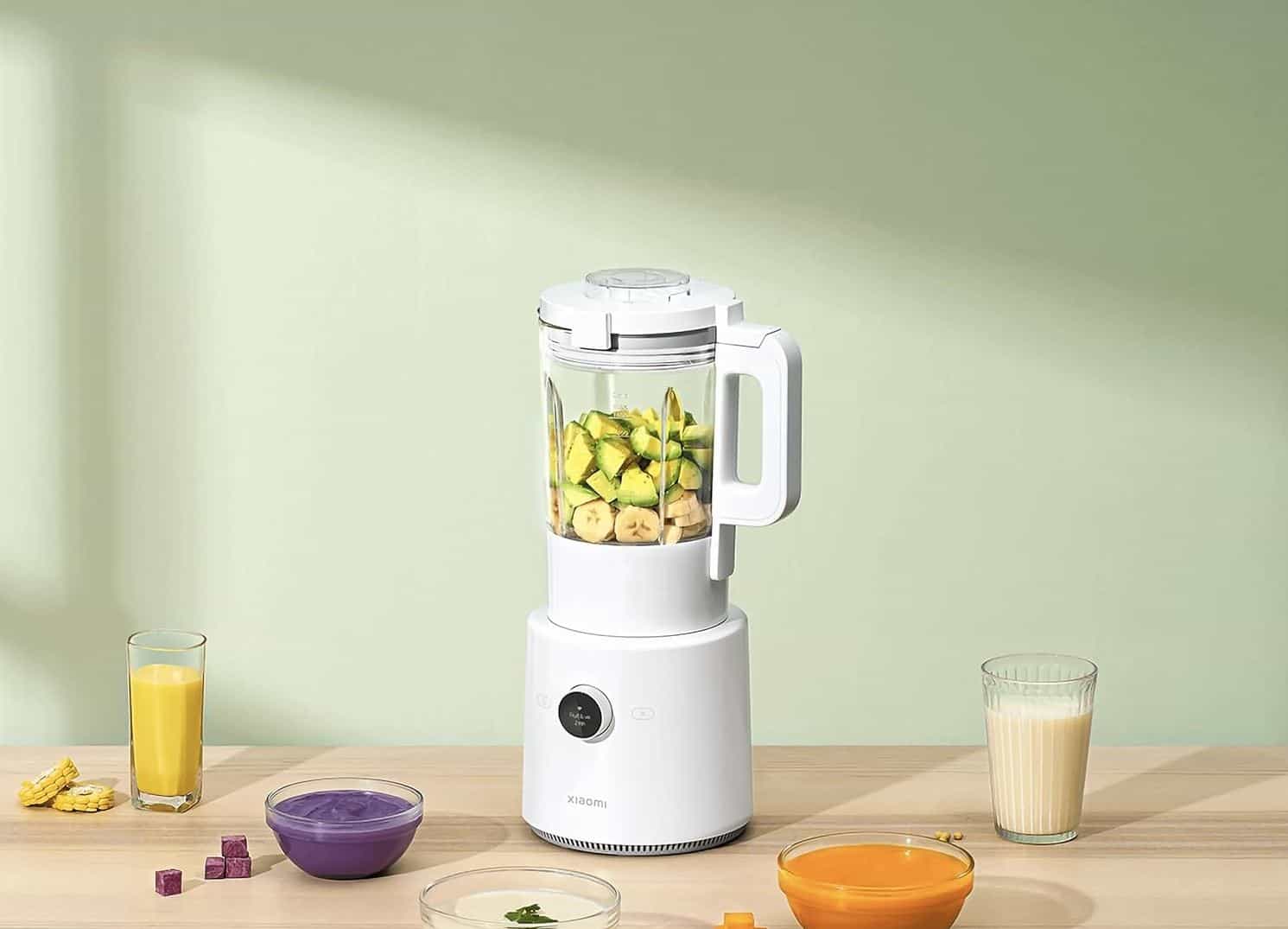The popular electronics manufacturer Xiaomi has introduced its newest addition to the Mijia kitchen appliance series: the Smart Quiet Blender P1. Currently available for pre-order on JD.com, this blender is priced at 699 Yuan (approximately $98).
The Mijia Smart Quiet Blender P1 boasts state-of-the-art specifications that set it apart from conventional blenders. Featuring a powerful variable frequency brushless motor, it achieves an impressive maximum speed of 35,000 RPM, backed by 500W for blending and 1000W for heating. The motor’s design incorporates advanced algorithms that optimize blending by dynamically adjusting based on the ingredients’ characteristics.
With a capacity of 1.5 liters for cold drinks and 1.0 liter for hot beverages, the blender caters effectively to both individual and family needs. Its ceramic non-stick coating ensures that cleaning remains hassle-free, preserving both the device’s aesthetics and functionality over time. The blending technology includes a unique 4-rib system and dual-layer, six-blade cutter, ensuring complete ingredient integration.
One of the standout features is its sophisticated noise reduction technology, which limits operational sounds to a mere 37dB(A), making it suitable for quiet environments. Additionally, the appliance offers smart scheduling capabilities, antibacterial features, and safety measures designed to prevent overheating and spills. Its compatibility with Xiaomi’s HyperOS Connect allows users to control the device remotely, access various recipes, and customize blending textures, making it a versatile tool for culinary enthusiasts.
The Impact of Smart Kitchen Appliances on Modern Living
The introduction of smart kitchen appliances, such as the Xiaomi Mijia Smart Quiet Blender P1, represents a significant shift in how individuals, families, and even entire communities approach cooking and food preparation. These technologies not only enhance culinary experiences but also influence lifestyle choices and community dynamics.
Enhancing Culinary Experiences
Smart kitchen devices like the Mijia Smart Quiet Blender P1 are designed to make food preparation easier and more enjoyable. With advanced specifications such as a powerful motor and noise reduction technology, these blenders cater to various cooking styles and preferences. The ability to blend quietly at just 37dB(A) opens up new possibilities for home chefs, enabling them to experiment with recipes without disturbing household peace or early morning routines.
Moreover, the incorporation of smart features such as remote control via smartphone apps allows users to customize their cooking experiences. For instance, families can schedule blending times, access a multitude of recipes, and control the appliance from anywhere in the home. This innovation not only saves time but also encourages more people to engage in cooking, leading to potentially healthier eating habits.
A Healthier Lifestyle and Sustainability
Smart appliances often promote healthier eating by facilitating the preparation of fresh, homemade meals. This shift from processed foods towards raw ingredients reflects broader trends in health consciousness. In communities where access to fresh produce is limited, these devices can make nutritious options more achievable, contributing to overall public health. Moreover, as consumers become more aware of sustainability, using a blender for daily beverages can reduce reliance on single-use plastics, such as those found in store-bought juices or smoothies.
Controversies Surrounding Smart Appliances
Despite their benefits, the rise of smart kitchen appliances is not without controversy. Concerns regarding data privacy and the security of connected devices are prevalent. Consumers often face the dilemma of whether the convenience of smart technology outweighs potential risks associated with internet-connected appliances. Reports about unauthorized data collection and hacking incidents cast a shadow over these innovative products, prompting discussions about regulations and manufacturers’ responsibilities.
Moreover, there is a growing debate concerning environmental impact. While smart kitchen appliances are designed for efficiency, the production and disposal of electronic appliances contribute to e-waste. Advocates for sustainability emphasize the importance of manufacturers producing durable appliances that last longer and are recyclable at the end of their life cycle.
The Global Market and Economic Implications
The advent of smart kitchen appliances has implications beyond individual households; it affects economies and markets on a global scale. As manufacturers like Xiaomi expand their product lines and push for innovative technology, this trend creates opportunities for growth in sectors such as consumer electronics, home goods, and even logistics. Countries that embrace smart home technology can enhance their competitiveness in the global market, attracting investments and driving technological advancements.
In conclusion, the rise of smart kitchen appliances like the Xiaomi Mijia Smart Quiet Blender P1 signifies more than just a new product; it reflects shifts in lifestyle, health consciousness, and economic opportunities. While these innovations can enhance lives and foster healthier communities, it is essential to navigate the accompanying challenges thoughtfully. For more on smart home technology, visit Xiaomi’s official website.
The article has been updated: 2024-11-02 22:54
Here are some suggested related links:
1. Mi Official Site – Explore the latest products and innovations from Xiaomi, including smart home devices, smartphones, and more.
2. XDA Developers – Stay updated with the latest news on technology and gadgets, featuring reviews and comparisons of new products in the market.
3. TechRadar – A leading tech news and reviews site, providing insights on new gadgets, including kitchen appliances and smart devices.
4. CNET – Get expert reviews and buying guides for electronics and smart home products, highlighting the latest trends and innovations.
5. TomsGuide – Discover technology news, reviews, and tips that cover a wide range of gadgets, including smart kitchen appliances like blenders.
The article has been updated: 2024-11-06 21:58
What are the key features of the new Xiaomi Mijia Smart Quiet Blender P1?
The Xiaomi Mijia Smart Quiet Blender P1 boasts several innovative features, including a powerful motor designed for quiet operation, multiple blending modes for different ingredients, and smart connectivity options that allow users to control the blender via a smartphone app. It also includes a durable stainless steel blade system for efficient blending and a sleek, modern design that fits seamlessly into any kitchen. With its focus on user convenience and performance, the P1 aims to enhance the blending experience for home cooks.







